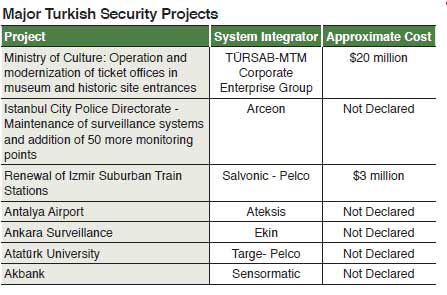STEADY MIGRATION TO IP
Interest in IP remained strong in 2010, continued from 2009. This was noticeable, particularly in surveillance. IP has become the first choice in the past five years and analog will gradually disappear in Turkey over the next five to six years, said Abdullah Lermi, Representative of Alte Electronics. At least 80 percent of large projects in 2010 deployed IP integration, said Aysegül Demirkol, Sales Representative of Anixter.
Both government and private projects now specify IP in their bids, indicating the demand for networked solutions, Oral said. As adoption of network cameras grew, prices fell for multiple brands of cameras, Tuncel said. On the other hand, there is still insufficient information on network cameras. “Customers hear about IP but find it difficult to make up their minds, since they are not informed well enough,” Cobanoglu said. “It is essential that consultants provide assistance.”
Video analysis and HD cameras were key trends in network surveillance. Higher resolution cameras were widely adopted in 2010 and are expected to gain market share, Uzelli said. Denizhan Akkaya, GM of Nemesis, believed HD and video analysis are significant, as analysis alone is insufficient, but business intelligence will benefit user business processes directly.
HD cameras are shifting to more camera models, such as PTZ models, said Yusuf Ziya Oncel, Country Manager for Turkey, Pelco (a Schneider Electric company).
TOP GROWTH VERTICALS
Retail shopping centers and government projects dominated the security market in Turkey. City surveillance projects are also continuing from initial launches in 2008. In finance, security improvements in banks are still underway since 2009. Banks invested strongly in security, particularly in IP, Yalcin said.
Government projects were largely concentrated around transportation, such as tunnels, roads and regional airports. “City surveillance systems have gained outstanding market share in the last three years, and this will continue, even at a slow pace,” Akkaya said. “However, there were not very smart practices in terms of analysis for these systems last year.”
City surveillance will eventually be adopted in all Turkish cities and be integrated. “These systems are being used by both law enforcement units and their related agencies; this way, traffic can be monitored as well,” Cobanoglu said. “There are now companies that have expertise in this field.”
Along with large projects, numerous medium-size projects were completed, such as shopping malls and hospitality. Two such projects were the Ora Shopping Center and the Zorlu Center, a mixed-use site combining a five-star hotel, luxury apartments and a mall. Both are expected to be completed in 2011.
Istanbul's city surveillance projects continues to be rolled out, with 50 more monitoring points added by Arceon and Panasonic for the Istanbul City Police Directorate. Another public project involved integrating video surveillance for all branches of the Directorate of Land Registry and Cadastre, which was completed by Senkron Security.
Railways also saw movement. The renewal of the Izmir local train surveillance was carried out by Pelco and Salvonic, which was worth about $3 million.

NEWCOMERS
IT began entering security in 2009, with long-lasting effects on the current state of security. However, if a surveillance system malfunctions, it is sometimes difficult to find whether the problem is with the equipment or network. IP can be an advantage for more savvy buyers who look beyond the price tag for value.
The construction boom in Turkey has attracted global brands. Panasonic opened a local branch, a trend Axis Communications and Samsung Techwin are expected to follow.
CHALLENGES
While Turkey has numerous security opportunities, it still has an education gap. Some manufacturers complain about “insensible” prices and product selection. “Not only end users but even some integrators do not know which camera should be used or what quality of product should be selected,” Lermi said. “I believe that this common situation will eventually be solved through more knowledge.”
Consultants will be responsible for learning about more systems, said Ayse Cüycü, Project and Sales Manager of Ateksis. More professionals can be trained through vocational programs, making up for the lack of qualified personnel, Goksen said. Finally, skilled engineers require better management and training, Oncel said.
One glaring issue in Turkish security is poor quality products. Standards will be necessary to reverse this trend, said Artun Tekiroglu, GM of Komsek, echoing the opinion of many industry experts.